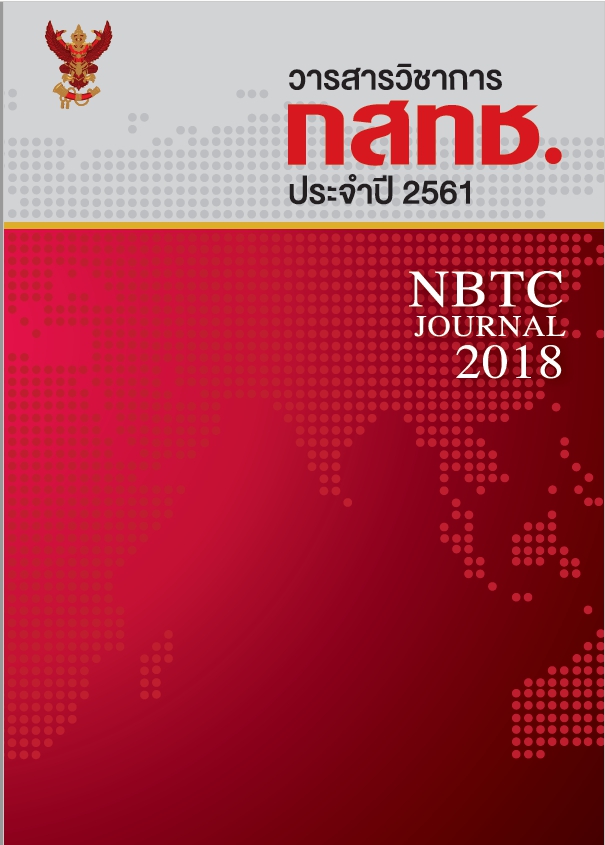A Study of Different Generations in the Need for Flexible Benefits : A Case Study of Office of the National Broadcasting and Telecommunications Commissions of Thailand (NBTC)
Keywords:
Benefits, Flexible benefits, GenerationAbstract
This research aims to study the need for flexible benefits of the state enterprise officers working for Office of the National Broadcasting and Telecommunications Commission of Thailand (ONBTC). The number of subjects that constitute a study is 375 ONBTC officers, including permanent and contract officers. The findings of the present study indicate that a high level of benefit satisfaction towards the majority of female subjects with master degree are health and security benefits, welfare benefits, economic benefits, and social benefits respectively. Moreover, it is interesting to note that the subjects also have needs for flexible benefits. Specifically, if the organization implements the flexible benefits reform policy, the subjects most interested flexible benefits that they wish to be offered is provident fund. Considering the results of hypothesis test, the data that there was no significant differences between each aspect of benefit level satisfaction and generations. However, having made the comparison between the subjects’ needs for flexible benefits and generations differentiated by year of birth (Baby Boomers vs. Gen X vs Gen Y) and by the integration of tech-savvy into daily life (Generation C), it is interesting to note that these different generations affect to different needs for flexible benefits. Given the comparison between the needs for flexible benefits and demographic data, the results show that the differences in gender, position, income, and education have no bearing on the differences in the need for flexible benefits. However, the differences in marital status and years of work leads to differences in the need for flexible benefits.
Similarly, it is important to note that the differences in the need for flexible benefits are found in the emerging generations differentiated by the integration of tech-savvy into daily life (Generation C).
On the contrary, it is important to note that the differences in the need for flexible benefits have not found in the emerging generations differentiated by the integration of tech-savvy usage into daily life (Generation C).
References
ธัญญา ผลอนันต์. (2541). ค่าจ้างและสวัสดิการยืดหยุ่น 1. กรุงเทพฯ: ขวัญข้าว.
วิทยา ตันติเสวี. (2549). แบบฟอร์มเอกสารในการบริหารงานบุคคลและธุรการ. กรุงเทพฯ: บริษัท ธรรมนิติเพรส จำกัด.
สุขุมวิทย์ ไสยโสภณ. (2560). การบริหารทรัพยากรมนุษย์เชิงกลยุทธ์. ขอนแก่น: บริษัทเพ็ญพริ้นติ้ง จำกัด.
สุรางค์รัตน์ วศินารมณ์. (2540). สวัสดิการในองค์กร : แนวคิดและวิธีการบริหาร. กรุงเทพฯ: เม็ดทรายพริ้นติ้ง.
อนันตชัย คงจันทร์. (2557). Human Resource Management การจัดการทรัพยากรมนุษย์. กรุงเทพฯ: หจก.ภาพพิมพ์.
อนิวัช แก้วจำนง. (2552). การจัดการทรัพยากรมนุษย์. สงขลา: บริษัท นำศิลป์โฆษณา จำกัด.
เสาวคนธ์ วิทวัสโอฬาร. (2559). เจเนอเรชันวายในองค์กร: การศึกษาความสัมพันธ์ระหว่างความสอดคล้อง
ของค่านิยมกับความผูกพันต่อองค์กร. Journal of Management Sciences, 33(1) :หน้า 55.
วรมน บุญศาสตร. (2558). การสื่อสารการตลาดสู่กลุ่มผู้บริโภคเจเนอร์เรชั่น ซี ในยุคดิจิทัล. วารสารการสื่อสารและการจัดการนิด้า ,
(1) :หน้า 16-17.
Mariann Hardey. (2011). Generation C Content, creation, connections and choice. International Journal of Market
Research, Vol. 53 (Issue 6): p 752.
นิติพล ภูตะโชติ. (2556). พฤติกรรมองค์กร. กรุงเทพฯ: สำนักพิมพ์แห่งจุฬาลงกรณ์มหาวิทยาลัย.
คมกริช เพ็ญศรี. (2554). ความต้องการสวัสดิการของพนักงานบริษัท ไซเบอร์แพลนเน็ต อินเตอร์แอคทีฟ จำกัดเพื่อเตรียมความ
พร้อมสู่การเปลี่ยนแปลงเป็นบริษัท (มหาชน). (สารนิพนธ์ปริญญามหาบัณฑิต). มหาวิทยาลัยธรรมศาสตร์, คณะสังคมสงเคราะห์
ศาสตร์.
งามจิต อินทวงศ์. (2556). ความต้องการสวัสดิการของพนักงาน มหาวิทยาลัยเทคโนโลยีราชมงคล ตะวันออก วิทยาเขตบางพระ
จังหวัดชลบุรี. (ปัญหาพิเศษปริญญามหาบัณฑิต). มหาวิทยาลัยบูรพา, คณะรัฐประศาสนศาสตร์.
ฐานิฎา เจริญเลิศวิวัฒน์. (2558). ความพึงพอใจในค่าตอบแทน สวัสดิการและคุณภาพชีวิตการทำงานที่มีผลต่อความจงรักภักดีต่อ
องค์กร: กรมควบคุมโรค กระทรวงสาธารณสุข. (สารนิพนธ์ปริญญามหาบัณฑิต). มหาวิทยาลัยเทคโนโลยีราชมงคลธัญบุรี, คณะ
บริหารธุรกิจ.
นิสัย จันทร์เกตุ. (2558). พฤติกรรมการใช้งานสารสนเทศเพื่อการศึกษาที่มีผลต่อความสำเร็จในการเรียนของ
นักเรียนวิทยาลัยเทคนิคชัยนาท. (สารนิพนธ์ปริญญามหาบัณฑิต). มหาวิทยาลัยเทคโนโลยีราชมงคลธัญบุรี, คณะบริหารธุรกิจ.
ศศิจันทร์ ปัญจทวี. (2560). ปัจจัยที่ส่งผลต่อการยอมรับการใช้ระบบสารสนเทศ กรณีศึกษา สถาบันการพล
ศึกษา วิทยาเขตเชียงใหม่. (สารนิพนธ์ปริญญามหาบัณฑิต). มหาวิทยาลัยราชภัฏเชียงใหม, คณะบริหารธุรกิจ.
สยาม อินยิ้ม. (2547). รูปแบบจำลองสวัสดิการยืดหยุ่น ของธุรกิจอาหารสัตว์น้ำ กลุ่มธุรกิจเกษตรอุตสาหกรรม และอาหาร เครือ
เจริญโภคภัณฑ์. (วิทยานิพนธ์ปริญญามหาบัณฑิต). มหาวิทยาลัยธรรมศาสตร์, คณะสังคมสงเคราะห์ศาสตร์.
วภัสสราณัฐ รวยธนาสมบัติ. (2558). การศึกษาพฤติกรรมและปัจจัยที่ส่งผลให้เกิดความตั้งใจซื้อสินค้าผ่านอินเทอร์เน็ตของผู้
บริโภคในแต่ละเจเนอเรชั่น. (สารนิพนธ์ปริญญามหาบัณฑิต). มหาวิทยาลัยธรรมศาสตร์, คณะพาณิชยศาสตร์และการบัญชี.
วีณาวรรณ จักรชัยชาญ. (2550). ความต้องการสวัสดิการยืดหยุ่นของพนักงานในสถานประกอบการผลิตอัญมณี. (สารนิพนธ์
ปริญญามหาบัณฑิต). มหาวิทยาลัยธรรมศาสตร์, คณะสังคมสงเคราะห์ศาสตร์.
สมรัตน์ เชาวมัน. (2557). ความพึงพอใจของบุคลากรวิชาชีพต่อการจัดสวัสดิการของโรงพยาบาลนครธน.
(สารนิพนธ์ปริญญามหาบัณฑิต). มหาวิทยาลัยธรรมศาสตร์, คณะสังคมสงเคราะห์ศาสตร์.
สลักจิต ภู่ประกร. (2555). ความพึงพอใจในสวัสดิการที่ได้รับของพนักงานการไฟฟ้าส่วนภูมิภาค สำนักงานใหญ่. (สารนิพนธ์
ปริญญามหาบัณฑิต) มหาวิทยาลัยศรีนครินทรวิโรฒ, คณะบริหารธุรกิจ.
สรรเพชญ ไชยสิริยะสวัสดิ์. (3 มกราคม 2561). สแกนนิสัย"คน 4 เจเนอเรชั่น" แม้ต่างกันก็อยู่ร่วมกันได้. สืบค้นจาก
https://www.prachachat.net/news_detail.php?newsid=1401795159.
Downloads
How to Cite
Issue
Section
License
The Office of the NBTC holds the copyright of articles appearing in the journal. The Office of the NBTC allows the public or individuals to distribute, copy, or republish the work under a Creative Commons license (CC), with attribution (BY), No Derivatives (ND) and NonCommercial (NC); unless written permission is received from the Office of the NBTC.
Text, tables, and figures that appear in articles accepted for publication in this journal are personal opinion and responsibility of the author, and not binding on the NBTC and the Office of the NBTC. In case of errors, each author is solely responsible for their own article, and not concerning the NBTC and the NBTC Office in any way.



